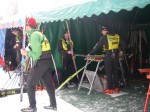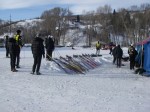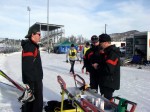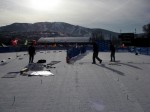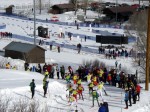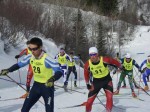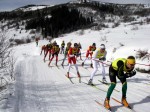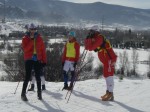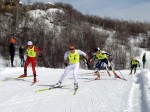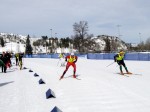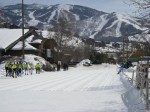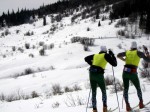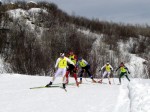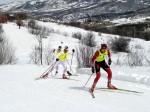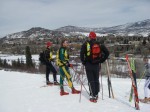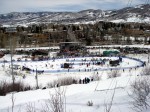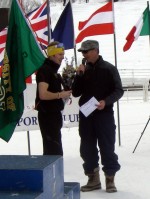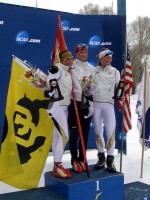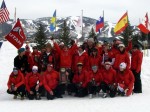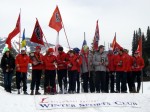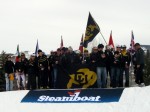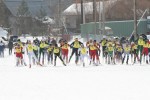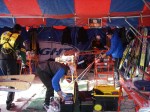
The second and final race day of races at the 2010 NCAA National Collegiate Nordic Skiing Competition in Steamboat Springs, Colorado, hosted by the University of Colorado: 15 and 20 kilometer mass start skate races.
The morning was more gorgeous than expected at Howelsen Hill; with low overnight temperatures and predicted cloud cover never appearing, the sky was clear and the sun shone off fresh groomed, hard frozen track. The biggest questions on the wax techs’ minds was how quickly the temperature would raise and if the sun would transform the track from frozen ice crystals to wet mush. In preparation of predicted high temperatures in the upper 40’s, the race committee had decided to move the races one hour ahead of the scheduled 10am, so at the bright and early hour of 9am the men’s 20 kilometer mass start race was underway.
Conditions were very fast for the first half of the men’s race, after which the sun did transform the snow to make for more wet and slower conditions for the women’s race, but the track never became too soft or mushy, and combined with the many wide swaths of track around the 5km loop on Howelsen Hill, the races skied fast and fair.
After the initial sprint for position off the start of the men’s race, the pace – led by Thursday’s classic champion, Matt Gelso of CU – slowed considerably and the whole field skied together for the first of four laps around the 5 kilometer course.

Gelso led for much of the race. As he explained it, his plan was to be in the front pack and then push the pace on the third lap, but as he started the race and realized he didn’t feel strong he made a tactical decision to lead the pack from the start.
“ I just decided to lead the whole thing because otherwise I was gonna be yo-yoing off the back and probably not be anywhere near the top,” explained Gelso of his strategy, “so I figured if I set my own pace I’d probably be able to hang in there – and it worked out well.”
For not feeling in top form, Gelso sure didn’t slow the pace for long. The field was starting to spread out as they passed through the stadium after the second lap, and was strung out considerably by the third lap.
As race winner Franz Bernstein of UVM,explained, “ The race wasn’t that fast the first two laps, the field was still stuck together. Third lap it got a little bit faster, people dropped off a little bit and on the fourth lap, on the first steep hills, some people made a move.”
Those racers who made a move were Gelso, and Martin Kaas of Denver.
Gelso said, “I tried to kind of hammer the pace the 2nd, 3rd, and the beginning of the 4th [laps], but at the end of the 4th, right before the top of the corner at about two, two and a half K, Martin Kaas took off and I managed to cover his move somehow.”
Meanwhile, Bernstein found himself losing ground on the lead pack. “I actually dropped back a little bit and I had a gap of about 30 meters, but I was able to close on the flatter part on the top again.”

Bernstein said he had more confidence about his chances of winning when it was just the three skiers left at the top of the final section of the course, a two kilometer series of downhills into the stadium.
“I knew I had a chance if I could stick with them,” said Bernstein.
Even after his second place finish in Thursday’s classic race, Bernstein wasn’t sure of his chances at topping the field on this day. “I had way better classic results this year than skating results so I was a little bit nervous; skiing at altitude and it’s a long race and especially Matt Gelso and Martin Kaas are really good skaters, I just [thought I would try] to stick with them as long as I can and maybe have a chance for a sprint and that was exactly what it came down to today.”
And that was what Gelso didn’t want to happen; when he made a move on the 4th lap he hoped to drop Bernstein for good.
“Then Bernstein caught us right before we started going downhill,” said Gelso, “and I was pretty nervous about that because I knew he was a good sprinter and that was exactly who I didn’t want to get in a sprint with.”
Gelso had a right to be worried, as Bernstein sprinted to the front and challenged Kaas, neck and neck, down the final stadium stretch to the finish line, where Bernstein edged Kaas but just over one second at the line.
Gelso finished third, 2.7 seconds behind Kaas.

As he does not feel he is much of a sprinter Kaas said he was happy to have been so close at the line. He felt good about his race because after a great start to his season he then experienced several weeks leading up to the championships where he did not feel in top form.
When confirming that he was a junior in school this year with one year of eligibility left Kaas replied with a grin, “Yes, and next year I will win!”
Kaas will have to contend again with Bernstein, who is only a sophomore, but not with Gelso, who is a senior. Gelso remarked about his race and the championships, “With how I felt I am super psyched to be up there, I had a good weekend, my last NCAA’s. . . a national championship and third place, I think I can end my career on a good note.”
And by career he means college career. Though he is not positive what he will do next year (and, of course, everyone is asking him this question) he would like to keep his options open, “There’s a big chance I’ll take one more year of skiing and see what I can do, but who knows. . . .”
To wrap up this season Gelso may compete at the Gold Rush in California, but after that he’ll take a break from the Nordic scene . “I’m gonna go kayaking and have fun!”
The most impressive team showing in the men’s race came from the trio from Montana State, who skiied much of the race together and ended the race together as well, with a 5th-7th place sweep: Bernhard Roenning 5th, Tyler Reinking 6th and Ryan Scott 7th.With bib numbers 37, 19, and 30 (bib number denotes ranking in a mass start race) the men put on inspiring performances.

The women’s race played out a bit differently than the men’s race. As is usually the case in women’s mass start events, the pace was kept high from the sprint off the start until the sprint to the finish line.
The race was led by a pack of women who soon separated themselves from the rest of the field. The lead pack consisted of Thursday’s classic champion, Antje Maempel from Denver University, Colorado’s Alexa Turzian and Eliska Hajkova, Nevada’s Maria Graefnings, and Dartmouth’s Rosie Brennan, who was runner-up in the classic race.
Maempel led a good portion of the race but said that the other women took turns pulling the lead as well. Starting the last lap, however, the lead pack was whittled down to three racers: Maempel, Turzian, and Hajkova.

Then, Turzian pushed the pace. She knew, from having lost last year’s 15km skate in a sprint to the finish with Maempel, that the Denver skier had a fast closing speed. Trying to avoid another sprint finish and gunning for the win, Turzian planned to try and gain ground over Maempel before the last kilometer. But Maempel proved too strong a competitor, closing the gap on Turzian and pulling away in the final stretch to capture the win by six seconds.
Even with Turzian trying to gap her before the finish, Maempel said she was confident in her ability to take back the lead. “I’m a pretty good sprinter and I was coming from behind, which is always kind of an advantage.”

Turzian would have loved to take the victory, but said she was happy with her own race because she had executed her strategy as planned and though it did not result in the win she could have done nothing more.
Maempel was, of course, pleased with the race and jubilant about the double NCAA victories. She said that before the race she “felt pretty confident and I knew from our guys’ team that we had really good skis, so that helped.”
“It was actually pretty fun today,” Mempel continued, “I thought it was going to be really chaotic, as it usually is in the women’s races, but it was pretty relaxed. . .”
Maempel is a junior, but may graduate early and therefore not ski for Denver next season. She is already planning on graduate school and said that she probably will not continue ski racing, as skiing in Denver has been a great experience for her and the racing is “much more fun than I had back in Germany.”
Part of the fun, of course, is not only earning an individual victory, but helping your team to a victory as well. With Maempel’s win, Denver took the overall team championship title (which combines alpine and nordic results) for the third year in a row, with 785.5 points. Denver was one of four teams who had a full roster of 12 competitors (6 nordic and 6 alpine) in the championships, the other teams being Colorado, who placed second with 714 points, Utah (placing 4th) and Dartmouth. The University of Nevada, with one participant short of a full team, took third place in the team standings.

All American Women:
1 1 MAEMPEL, Antje DU 41:03.0 50.0
2 9 TURZIAN, Alexa CU 41:09.0 47.0
3 7 HAJKOVA, Eliska CU 41:42.5 44.0
4 4 GRAEFNINGS, Maria NEV 42:23.7 41.0
5 8 BRENNAN, Rosie DAR 42:25.9 39.0
6 12 ERMOSHINA, Polina UNM 42:34.7 37.0
7 21 ELDEN, Mari DU 42:36.2 35.0
8 25 BRONGA, Jaime UAA 42:46.5 33.0
9 20 KIESEL, Kaelin MSU 42:47.9 31.0
10 15 REID, Joanne CU 43:05.0 30.0
All American Men:
1 2 BERNSTEIN, Franz UVM 49:19.7 50.0
2 1 KAAS, Martin UNM 49:20.9 47.0
3 4 GELSO, Matthew CU 49:23.6 44.0
4 11 LOEVENSKIOLD, Harald DU 49:26.0 41.0
5 37 ROENNING, Bernhard MSU 49:27.7 39.0
6 19 REINKING, Tyler MSU 49:31.1 37.0
7 30 SCOTT, Ryan MSU 49:32.6 35.0
8 12 JOHNSON, Patrick D MID 49:33.6 33.0
9 34 TREINEN, Lex UAA 49:41.6 31.0
10 3 OCARIZ, Santiago UWGB 49:44.3 30.0
Photos of the day(click to enlarge):

